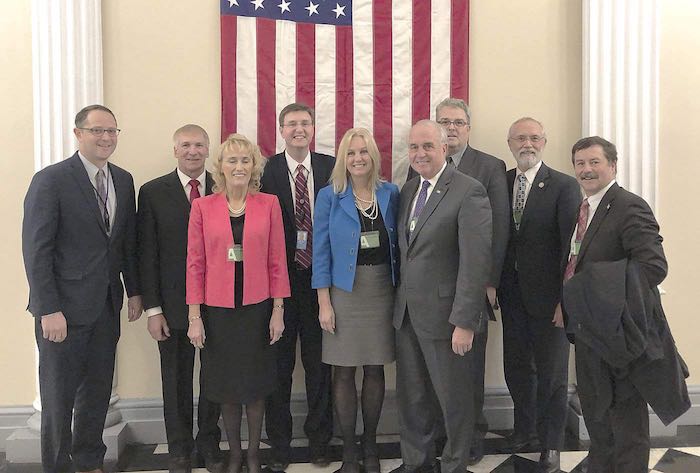forum
library
tutorial
contact

Washington Delegation Meets with White House
about Columbia Basin Project
by Matthew Weaver
Capital Press, December 19, 2017
|
the film forum library tutorial contact |

|
Washington Delegation Meets with White House
by Matthew Weaver
|

A delegation of officials, farmers and lawmakers from Washington state met with White House and Department of Interior officials last week to educate them about the need for funding to replace shrinking groundwater supplies in the Odessa subarea with Columbia River water.
Meeting with Ray Starling, special assistant to President Donald Trump on agriculture and agricultural trade, were farmers Randy and Michele Kiesz of Ritzville and Clark Kagele of Odessa, state Department of Agriculture director Derek Sandison, state Rep. Mary Dye, state Sen. Mark Schoesler and U.S. Rep. Dan Newhouse.
They also met with representatives of the U.S. Department of the Interior.
Michele Kiesz is a landowner near the first pumping station in the Odessa groundwater replacement project slated to receive river water. She estimates the total cost to her farm would be more than $300 per acre per year for 30 years.
"We can't afford to grow anything to come close to that," she said.
Kiesz and other landowners spoke to Schoesler, Dye and state Sen. Judy Warnick seeking assistance in filling the gap between what they can afford and what's needed.
"We told them the pumping plants are being put onto the shoulders of the landowners, and we just can't afford it," Kiesz said. "Unless we get help, we're going to go away. We're not going to be out there any more. The big companies are going to come in and they're going to take over this, or farming will go completely away in Eastern Washington. It's going to be horrific if this area goes dry, and we're headed that way."
The legislature put $15 million in the state capital budget to help fund the project, which would reduce pumping station construction costs by $8 per acre, Kiesz said.
Every little bit helps, she said.
That budget is being held up by Senate Republicans, who refuse to pass it until the Legislature passes a fix to the state Supreme Court's Hirst decision, which limits the development of rural wells.
The White House meeting was designed to educate and update the Trump administration on the project, Kiesz and Kagele said.
The Washington delegation is seeking $5 million to $10 million in federal funding for 10 to 15 years, and for the project to be included in the president's infrastructure package.
"We're shovel-ready, we have the water available, we're way ahead of the game and we can actually produce results immediately for the president" in comparison to other potential water projects, Kiesz said.
Kiesz said she hopes Trump sees the project as an opportunity "to hang his hat on something pretty awesome." She's encouraged by bipartisan support for the project.
Kiesz and Kagele, who are cousins, said White House representatives were "very receptive."
"(The next step) is to put it in front of them again," Kagele said. "As the infrastructure package is worked on, we want to make sure they have it on their radar."
Federal funding may be disbursed to and by states, Kagele said.
Kiesz said the benefits would reach beyond farmers. The cities of Lind, Ritzville and Othello have all experienced problems with declining water wells, she said. Most wells in the Odessa area have been depleted over the years. They were meant to provide a temporary source of water until the rest of the Columbia Basin Project was built. It will deliver water from the Columbia River to the area.
"We are looking at our own Flint, Mich., right now," she said. "It's not just about the farming, it's about people being able to drink water, plain and simple."
"Washington state has skin in the game; now it is time for the federal government to step up and complete the largest Bureau of Reclamation project in this nation's history, which Congress authorized over 60 years ago," Newhouse's office said.
learn more on topics covered in the film
see the video
read the script
learn the songs
discussion forum
